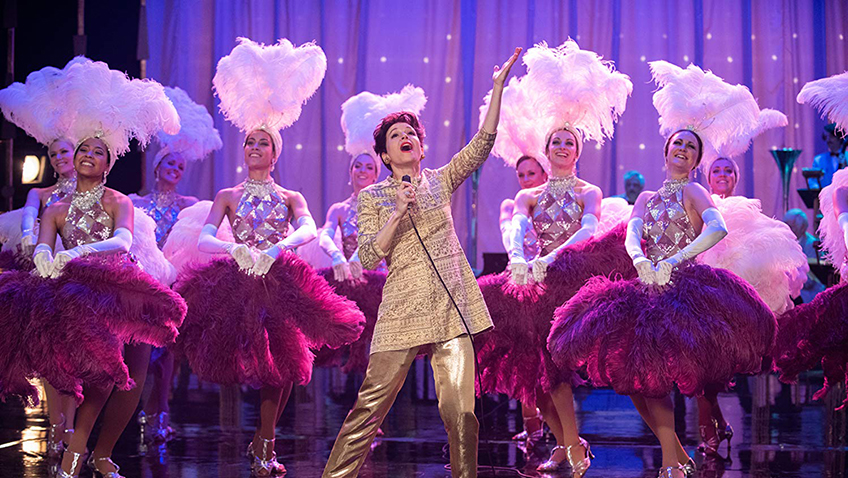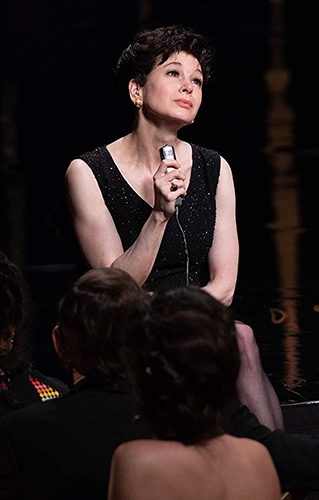Joyce Glasser reviews Judy (October 11, 2019), Cert. 12A, 118 min.
The tarnished, discarded stars of the so-called Golden Age of Hollywood who ended their careers in regional or London theatres in Great Britain have been emerging in films, with Gloria Grahame (Film Stars Don’t Die in Liverpool); and Stan Laurel & Oliver Hardy (Stan & Ollie), who could credit the studio system with their fame as well as their hardship, multiple marriages and drinking (if not drug) problems. But arguably no movie star and stage performer paid as high a price for her fame as Judy Garland (Renée Zellweger), from her childhood in the clutches of MGM star-maker Louis B. Mayer (Richard Cordery) to her final months singing her heart out the stage of Talk of the Town under theatre impresario Bernard Delfont (Michael Gambon) – who orchestrated Laurel and Hardy’s British comeback.
The time was ripe for a biopic of Judy Garland, who died, age 47, of an accidental overdose in London in June 1969, less than two months before the Sharon Tate murders shook Hollywood. One of the only bankable stars who could portray Garland, Renée Zellweger is now 50 and has herself taken a break from showbiz, making this a kind of mini comeback. And since, notwithstanding her star turn in the film Chicago back in 2002, few realised she could sing, this is quite a comeback.
If Judy feels stagey, it might be because director Rupert Goold is an esteemed theatre director (his only previous feature film being True Story), and the script is based on Peter Quilter’s stage drama, End of the Rainbow. But Judy’s life was not only stage managed, it was lived on movie sets and on the stage. This is made clear from scriptwriter Tom Edge’s (U2’s musician and songwriter, David Howell Evans) insightful and intelligent adaptation which includes flashbacks to the 15-year-old ingenue’s (wonderfully portrayed by Darci Shaw) oppressive, regimented life on the MGM lot just prior to the filming of The Wizard of Oz.
Judy who went to school on the lot with Ava Gardner, Lana Turner and Liz Taylor, was self-conscious about her looks. She was not leading-lady gorgeous or even glamorous and at 4’11’’, her roles, like those of her childhood film and stage partner Mickey Rooney, were limited by her height as she aged. Her height meant that every pound she put on showed, and it was her eating disorders and obsession with her weight that finally ended the longest of her five marriages, to Sidney Luft (Rufus Sewell), father to her two youngest children, Lorna (Bella Ramsey) and Joey Luft (Lewin Lloyd).
In the flashbacks to 1937-39, we see Mayer (Richard Cordery) reprimand Judy for taking a break in her long day and given uppers to keep her awake and downers so she could sleep. Everything from her diet (eating a hamburger or a slice of her own birthday cake is strictly prohibited) to her love life is controlled. In a touching scene where Judy is being a normal teenager with her soulmate, Mickey Rooney, she asks about their relationship. ‘I think we’re just pals,’ he ruminates, ‘but ask Mr Mayer.’ The first and shortest of Mickey’s eight short-lived marriages was to Ava Gardner.
The film begins in LA 1969, where a now homeless Judy returns to the hotel that has been their home, with her hungry, exhausted kids, Lorna and Joey who had performed with her on stage. When, in a humiliating scene, she is denied credit, she takes the children to their dad’s sprawling Brentwood, LA home. They can stay, she cannot. It is difficult to image a star as big as Judy Garland being homeless, but since divorcing Luft, her managers (Freddie Fields and then David Begelman) embezzled and mismanaged her income, leaving her in debt. (Liza, 22 in 1969, worked to repay her mother’s debts).
Reluctantly, Judy heads for London where Delfont entrusts her to the care of Rosalyn Wilder (Jessie Buckley, herself a fantastic singer-actress, Wild Rose, Beast). Rosalyn has her hands full and is astonished when Judy refuses to rehearse, saying the space is ‘too damp.’ She has to drag Judy to the theatre, often drunk, and push her onto the stage, for Judy is petrified of the sold-out crowd. ‘Well, I see we have a band here,’ she says, getting acclimatised. ‘May as well put it to use.’
And then, nearly half-way through the film, we hear Judy/Renée sing By Myself, a song that never seemed as poignant or personal when Frank Sinatra sang it.
Just before she leaves for London, Garland, with nowhere else to go after dropping off her kids at Sid’s, goes to a party where she meets musician/entrepreneur Mickey Deans (Finn Wittrock), a handsome fan 12 years her junior. He shows up in London and they impulsively marry. Things are looking up when Mickey tells Judy he is capitalising on her success in the UK by working on a deal where she would earn royalties from a retail venture, without the obligation to perform. The relationship sours long before this deal falls through, sending Judy into free-fall.
If much of the film is familiar performer-biopic territory, the script, the excellent casting, the atmospheric cinematography that changes with each setting and venue, and Jany Temime’s gorgeous, spot-on costumes, work together to put us into the period and into Judy’s life. And there are stand out moments, including a fictitious friendship with two gay fans who tell Judy that they saw her in 1964, but could not sit together (the law-making homosexuality a crime changed a few months after this encounter in 1969). But Goold saves the best for last with a peerless set-piece in which Garland, who has alienated her audience by performing drunk, makes a final, surprise ‘guest’ appearance, sitting on the edge of stage and almost whispering ‘Over the Rainbow.’ The tension is immense, and the emotion is so heartfelt, that you will be crying along with Judy’s audience.
There is a point in which Judy’s self-destructive behaviour becomes monotonous, and even the script’s humour and moments of triumph cannot avoid the tragic end that we all know is coming. Painfully thin, Zellweger makes Judy’s frailty all the more convincing, but though she can belt out a tune, even hinting at Garland’s sound, she is no Judy Garland. As Mayer tells young Judy, ‘you have that voice that will take you to Oz where none of those pretty girls can go.’
Zellweger is not trying to imitate Garland – a thankless task – but rather, she and Goold want to tell a showbiz story that resonates today with the likes of Harvey Weinstein and pressures on actors from social media. Failed marriages, eating disorders and unscrupulous managers are hardly unique: Leonard Cohen had to go back on tour in in his seventies in 2009 after being left penniless. The pressures of celebrity have driven many to drugs and drink and destroyed more contemporary singers from Janus Joplin to Amy Winehouse. The filmmakers want us to think back and question more than just the nomenclature behind the ‘Golden’ Age of Hollywood.
You can watch the film trailer here:







